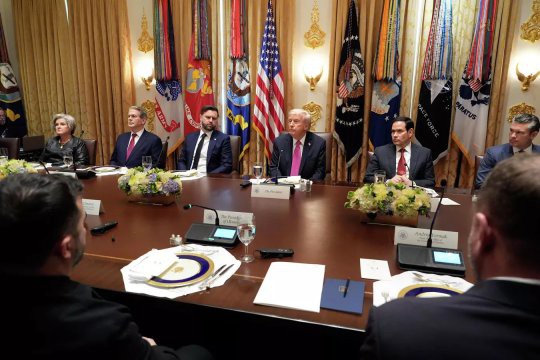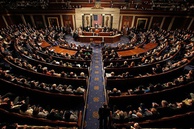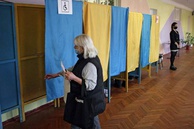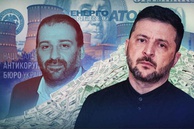The choice currently facing the US President is either to supply Volodymyr Zelensky with Tomahawk cruise missiles, or stop “another war.”
Donald Trump was given this choice, which brought him back to reality, during a telephone linkup conversation with his Russian counterpart Vladimir Putin. Before that phone talk, global media was brimming with conjectures about:
- Trump "disappointed with the pace of conflict resolution in Ukraine": "I am very disappointed because I had a very good relationship with Vladimir. It probably remains so." i
- Washington "is considering supplies of both Tomahawk supplies and other long-range missiles." ii
Euro-globalists perceived discussions about whether the White House might or might not give Tomahawk cruise missiles Ukraine, all “for the sake of ending the conflict,” as a sign that this would further escalate the situation, when Russia might succumb to provocation, and the US would be forced to intervene - all this serving the goal of inflicting a strategic defeat on Moscow. Trump's “displeasure” with Russia was also seen as a good sign. Furthermore, the plan was to create the impression that Trump, even though he did not receive the Nobel Prize, was already hailed as a peacemaker in the Palestinian-Israeli crisis, and that it was Putin preventing Trump from becoming a peacemaker, this time in the Ukrainian crisis.
It was with these hopes in mind that Zelensky travelled to Washington, with Ukrainian and Western media presenting this as a trip for Tomahawks and other long-range weapons. Ukrainian drone strikes on Russian fuel and energy infrastructure served as a backcloth to Zelensky’s visit. The resulting fuel shortage in several Russian regions was presented by the Ukrainian press as a 'serious crisis,' and this was successfully conveyed to Trump, who said that due to the war in Ukraine, the Russian “economy would collapse,” and that there were “long lines for gasoline” in Russia. iii iv
Zelensky and the Euro-globalists believed that Trump was ready to talk about supplying Kyiv with Tomahawks, which would force Moscow to agree to peace. Buoyed by Trump's statements and high hopes of clinching a deal with the US president, Zelensky flew to Washington.
However, just as the Ukrainian president was on his way, a phone talk with Vladimir Putin brought Trump back to reality. The conversation mostly centered on Tomahawk missiles, with Vladimir Putin clearly outlining his position regarding possible supplies of such weapons to Ukraine. v What exactly Putin told Trump during the conversation was not reported, but at an earlier meeting of the Valdai Discussion Club, Putin said: “It is impossible to use this missile [Tomahawk - D.B.] without the direct involvement of US military personnel. This would signify a qualitatively new stage of escalation, including in relations between Russia and the United States." vi
Zelensky was flying to Washington hoping that after meeting him in the White House, Trump would make "clear decisions” regarding the weapons that Washington was ready to provide to Kyiv. Zelensky’s chief of staff, Andriy Yermak, said that “Tomahawks are Ukraine's top priority, Kyiv is still awaiting a decision, it believes that such weapons can change the course of the game' (!), and that the Ukrainian side wants to acquire other systems, whose deliveries require US approval.” vii"
Counting on Trump's readiness to provide Tomahawk cruise missiles for strikes on Russia’s economic infrastructure, Zelensky brought Trump maps showing "sore spots of the Russian defense and military economy that could be pressured to force Moscow to end the war." viii
However, Zelensky came to Washington only to meet a different Trump, not the one who was "disappointed" with Putin, but one who had agreed with Putin on a next meeting.
Moreover, adding insult to injury, Trump said, "We need Tomahawks and we need a lot of other things that we’ve been sending over the last four years to Ukraine. That’s one of the reasons why we want to end this war. Hopefully, we’ll be able to get the war over without thinking about Tomahawks. We are quite close to it." ix
Trump's intentions are evident in the statement that he posted on his Truth Social platform.
"The meeting with President Volodymyr Zelensky of Ukraine was very interesting, and cordial, but I told him, as I likewise strongly suggested to President Putin, that it is time to stop the killing, and make a DEAL!” Trump wrote. "Enough blood has been shed, with property lines being defined by War and Guts. They should stop where they are. Let both claim Victory, let History decide! No more shooting, no more Death, no more vast and unsustainable sums of money spent. This war would have never started if I were President...” x
This sudden change in Trump's rhetoric stunned not only Zelensky, but also the Western media, which, dictated to by Euro-globalists, started making its own interpretations. According to The Financial Times, during a tense White House meeting, Trump allegedly urged Zelensky to accept Putin's terms or face "destruction" from Russia. The meeting reportedly degenerated into a shouting match with Trump discarding Ukraine's battle maps and repeating Putin's talking points from the previous call. xi
Apart from arms supplies, territories remain the second topic understandable to the West. There was no official information, but Western media did create an entire narrative on this issue:
The Washington Post wrote, citing officials that President's special envoy Steve Whitkoff insisted during Donald Trump's meeting with his Ukrainian counterpart Volodymyr Zelensky in the White House on ceding Donbass to Russia, noting that the region is “mostly Russian-speaking.” xii
Trump said that the conflict in Ukraine would end with Kyiv losing certain territories: "Well, he (President Vladimir Putin. - RT) will take something. You see, they fought, and he has a lot of territories. Well, to be frank, he won certain territories." xiii
Many Western media outlets then wrote that "Putin is ready to exchange Russian-occupied territories of Zaporizhzhia and Kherson regions for the withdrawal of the Ukrainian army from the Donetsk region." Ukrainian media speculates that it is difficult to draw an unambiguous conclusion regarding the territorial issue based on Western media reports about the conversation between Putin and Trump.
"During the conversation between Trump and Putin, the Russian leader stated that he was ready to abandon parts of the territories of two other regions of Ukraine that he had partially seized - Zaporizhzhia and Kherson - in exchange for full control over Donetsk, sources reported,” The Washington Post writes. The quote does not specify which particular part of the Zaporizhzhia and Kherson regions Putin is allegedly ready to abandon - that controlled by Russia or Ukraine (the transfer of the entire territory of Donetsk, Luhansk, Zaporizhzhia, and Kherson regions to Russia has been declared by Moscow as a condition for a ceasefire since last year). Logically speaking, however, this probably refers to the part controlled by Kyiv, just as Putin proposed in Alaska, where, according to media reports, he told Trump he was ready to abandon demands for the transfer of the entire territory of Zaporizhzhia and Kherson regions. But he stuck to his demand for the transfer of the entire territory of the Donetsk region.' xiv"
As we can see, Whitkoff is the only one showing signs of understanding the situation, while Western media views the issue of territories entirely from the standpoint of political geography. As for Kyiv, this is a matter of politics. The problem, however, is not only that, according to the Constitution of the Russian Federation, the new regions became part of Russia within their administrative borders, but also in the deep-seated causes of the conflict, which they want to mix in the issue of territories.
The main takeaway from the meeting in the White House was not Zelensky's failure and the disappointment of war-minded Euro-globalists. The main outcome was the political shift towards peace that Putin and Trump pursued by agreeing to meet in Budapest. The very choice of Budapest as the venue for the planned summit was an additional slap in the face for the EU and NATO. Much to the chagrin of European leaders, Trump and Putin will meet each other in a country led by Prime Minister Viktor Orban, who has long been at odds with NATO and the EU, has good relations with Trump, and opposes supporting Ukraine. Thus, meeting on European soil, Putin and Trump will discuss matters that contradict Europe's course towards militarization and the so-called "inflicting a strategic defeat on Russia."
If what Western media reports is true, the US plans to hold more preliminary working-level meetings with the Russian side before Trump and Putin meet in Budapest, than was done before the Alaska summit. This means a more thorough preparation for the meeting and, possibly, reaching some real agreements not on the Ukrainian crisis alone.
The meeting in Budapest will take place after Trump's triumph on October 10, when the Presidents of the US, Egypt and Turkey – Donald Trump, Abdel Fattah al-Sisi and Recep Tayyip Erdogan, along with the Emir of Qatar, Tamim bin Hamad Al Thani, signed a hard-won agreement to end the war in the Gaza Strip as mediators between Israel and Hamas.
The agreement was inked in the absence of Israeli Prime Minister Benjamin Netanyahu. The same could happen with the Ukrainian crisis. Zelenskyy is not needed to sign a peace deal, nor are those who want to fight Russia. However, this will require decisive action from Washington and will provoke a defiant reaction from Zelensky and his European supporters.
Besides, the situation could also develop along the lines of what happened on October 19, when Israel struck Rafah, in the Gaza Strip, which had not been previously shelled due to the presence of live hostages. xv This means that Zelensky may continue his "war game" to preserve his regime and realize the interests of liberal-globalists.
This also means that such an agreement would become not a path to peace, but a pretext for further military escalation that would discredit the decisions made by Putin and Trump. Chances are high that London is awaiting such an agreement to be able to keep working to destabilize the situation and arguing that “Putin does not want peace, Putin wants to fight." This could be preceded by provocations that would force Russia to at least go ahead with its Special Military Operation. In a situation like that, it becomes obvious that there will only be one solution, which Vladimir Putin mentioned a long time ago, and that is eliminating the root causes of the conflict.
The views of the author are his own and may differ from the position of the Editorial Board.
[i] https://www.gazeta.ru/politics/news/2025/10/14/26957204.shtml?ysclid=mgy1av904r315879338
[ii] https://tass.ru/mezhdunarodnaya-panorama/25180637
[iii] https://www.reuters.com/world/europe/russia-pushes-back-against-trump-warning-that-russian-economy-is-near-collapse-2025-10-15/
[iv] https://ukraina.ru/20251016/dolzhen-byl-pobedit-za-nedelyu-tramp-vyskazalsya-o-rossiyskoy-armii-1070167000.html
[v] https://www.interfax.ru/russia/1053255
[vi] https://tvzvezda.ru/news/20251022220-r5q0X.html
[vii] https://www.rbc.ru/politics/17/10/2025/68f193a09a7947594af16798
[viii] https://www.rbc.ru/politics/17/10/2025/68f29ead9a7947fbf2081a6c
[ix] https://www.interfax.ru/world/1053347
[x] https://ukraina.ru/20251018/1070287842.html
[xi] https://tvzvezda.ru/news/202510192059-CYsyi.html
[xii] https://www.rbc.ru/politics/19/10/2025/68f485429a7947440b3d49a5
[xiii] https://russian.rt.com/ussr/news/1548403-tramp-putin-territorii-ukrainy
[xiv] https://t.me/stranaua/213825
[xv] https://ria.ru/20251019/izrail-2049238604.html?ysclid=mgxzb4pcsj22811628
read more in our Telegram-channel https://t.me/The_International_Affairs

 19:18 20.10.2025 •
19:18 20.10.2025 •



























